Top reads from 2024 and the libertarian takeaways they feature

With just three weeks or so left in 2024, the time has come to take a look back at some of my favorite reads this year. A few of the books I’m about to talk about have been around forever, or so it seems. Others have only been on digital and brick-and-mortar shelves for a short time, but they deserve to be looked at as instant classics.
The Libertarian Book Reviewer is a reader-supported publication. To receive new posts and support my work, consider becoming a free or paid subscriber.
While they vary in genre, from fantasy to political thrillers, they all feature libertarian takeaways that we’re about to discuss below. So, if you’re ready to rock, let’s get started and kick things off with a bang regarding a book you may have heard of or even read a time or two.
Or, maybe you just watched the movie because that book was too long. Hey, if you took the ‘easy way out,’ don’t fear, as they covered the essentials in that particular movie as they pertain to the source material better than I’d’ve thought.
Harry Potter and the Order of the Phoenix by J.K. RowlingSeriously, part of me thinks that J.K. Rowling is a Seer, and she’s just throwing us off her scent by creating a (mostly) useless character named Sybil Trelawney. Hey, at least Trelawney made a couple of accurate predictions, but she’s got nothing on Rowling, whose classic Harry Potter and the Order of the Phoenix covered much of what we’ve seen come to the forefront in the 2020s.
Censorship
Legacy media and government ridiculing anything or anyone it doesn’t like
Legacy media and government accusing people of spreading ‘mis’ and ‘disinformation’
Government overstepping its bounds in a school
Government falsely accusing a man of trying to overthrow them
Government denying anything other than its own superficial narrative with support from legacy media cheerleaders
Are we having fun yet?
Yeah, if you’re wondering why I kicked off this blog with Harry Potter and the Order of the Phoenix, it’s all thanks to just how eerily similar things are here in the 2020s to what they were in 1995-96 Wizarding Britain.

I don’t know about you, but one character reminded multiple libertarian writers of a particular tyrant during the 2020s.
East of Eden by John SteinbeckThe absolute best first chapter of any book I’ve ever read came from John Steinbeck’s East of Eden. There’s a trilogy I’ve been working on in the dystopian/survival genre that I call Beyond the Lost, and the work’s prologue was a direct inspiration from Steinbeck’s classic when my main character, Quinn Cozens, reminisces about his time in the Upper Ohio Valley, namely the Wintersville/Steubenville area.
But my second favorite part is the first scene of Chapter 13, where Steinbeck talks about two things: creativity and innovation. While it was still relatively early in the book, it was this chapter that drove the work home because it praises the one thing that socialists and central planners of all stripes hate: Individualism.
Thanks for reading The Libertarian Book Reviewer! This post is public so feel free to share it.
Take this quote from the book, if you will:
“And this I believe: that the free, exploring mind of the individual human is the most valuable thing in the world. And this I would fight for: the freedom of the mind to take any direction it wishes, undirected. And this I must fight against: any idea, religion, or government which limits or destroys the individual (emphasis mine). This is what I am about. I can understand why a system built on a pattern must try to destroy the free mind, for that is one thing which can by inspection destroy such a system. Surely I can understand this, and I hate it and I will fight against it to preserve the one thing that separates us from uncreative beasts. If the glory can be killed we are lost.”
I know some may find it curious that I’ve included a quote from Steinbeck’s work in this article, considering he was said to have had rather collectivist views. But then again, George Orwell was a socialist and neither myself nor many libertarians have a problem with that, so I’m not admitting guilt here.
There’s so much to talk about in this one small passage that I could write an entire article about it. Anyway, what I got from it is that we know what does destroy creativity and innovation. And it’s something we’d seen repeated throughout the 20th century—big government.

Heck, it’s something that persists to this day. As with Steinbeck, myself, and I’m sure I speak for plenty of libertarians out there, would always fight for “freedom of the mind to take any direction it wishes.” Such a philosophy epitomizes creativity and innovation in my book, and it’s one of a few reasons I was a big fan of East of Eden.
The Erik Blair Diaries by John W. WhiteheadYou know how many horror stories celebrities might tell their entourage about having an annoying fan? Yeah, for John W. Whitehead, I’m going to be that annoying fan until he writes me a sequel to this book. The Erik Blair Diaries, much like The Text by Julane Fisher (which I talk about in a later section) deals with mass surveillance, but at a level of epic proportions.
Imagine having a chip implanted into your brain where a single thought could warrant an arrest. Or, possessing a journal that a time-traveling ancestor gave you and having law enforcement on your tail for that. Yeah, that’s the horror seen in The Erik Blair Diaries.
Heck, John W. Whitehead does a darn good job writing horror-based content. Just check out the latest piece he spat out at the Ron Paul Institute. The scary part? This stuff ain’t science or dystopian fiction, people, but it’s as real as you and me.
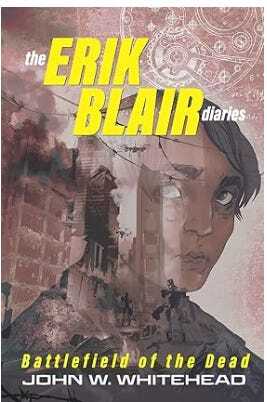
Yeah, and that grim reality is on full display in The Erik Blair Diaries. So, say hello to the surveillance state. But if you check out this one, you also might want this lightning-fast read turned into a video game by the time you’ve finished it.
The Flight of the Barbarous Relic by George Ford SmithI wrote three articles on The Flight of the Barbarous Relic, and this one was the king of all libertarian fiction I read. A political thriller, this book is more of an economics lesson than one that raises the stakes in some life-or-death situation like The Erik Blair Diaries.
But, it was still a fast-paced book that will teach readers about what fiat money really is: Nothing but trash at the end of the day, and why the gold standard will always reign supreme. And before you ask, yes, I collect precious metals that I’ll hopefully never need to use.
Considering George Ford Smith wrote this book in like 2008 around the time we had the Great Recession, things have mainly gone downhill from there for the fiat dollar. The You Know What hit in 2020, which did the dollar zero favors, and we’re still feeling the after-effects of that hike in inflation as we steamroll toward 2025.
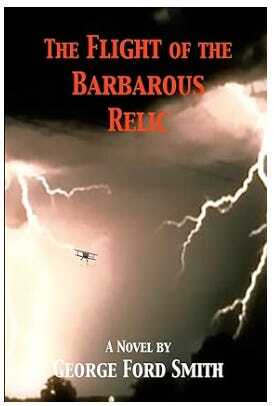
Want an in-depth look at where Smith got his inspiration? What Has Government Done to Our Money by Murray N. Rothbard is a good place to start.
Brave New World by Aldous HuxleyDo I really need to explain this one? I didn’t review Brave New World yet because it’s one of those books that deserves a deeper dive, given the punch Huxley packs in such a short read. But, it’s also one of the most messed up books I’ve ever read, and that should be a compliment to Huxley, given the society he created.
Cognitive conditioning in one’s sleep, mandatory drugs that get people so high they forget about life for a while and engage in odd activities, and intentionally creating a caste of worker drones are just a few things that scare the daylights out of me.
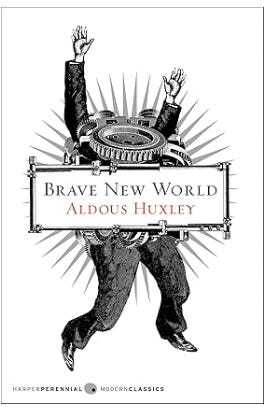
Yeah, I should’ve read this one closer to Halloween, as it makes for one heck of a horror story as opposed to dystopian fiction. And it’s a world I’d rather take a one-way ticket out of, much like one of the more compelling characters in the work.
The Text by Julane FisherThe story was arguably the clunkiest one I’d read in a long time, and I’ve had self-edited works read better than it. Still, if Julane Fisher can retain full rights to this thing, give it a nice, little revamp from an editing standpoint (the story rocked and it’s one I wouldn’t mind reading again), The Text would be more than a best-seller.
Yeah, we’d have a trilogy on our hands, given the way this book ended. The takeaway? Here, we got an antagonist working in sync with the federal government regarding this mass surveillance program that we seem eerily close to here in 2024. Keep in mind that this book takes place in 2048, and it seems to be well ahead of its fictional timeline as I write this.
Anyway, the tyrant in the Oval Office decides to “help” our main character, Rami, escape this surveillance corporatist madman in cahoots with said tyrant. The plan? Oh, so Rami can “owe her life to that tyrant” or something like that, meaning she would, in turn, credit that same mass surveillance for saving her.
That might sound familiar to some of us here in late 2024.
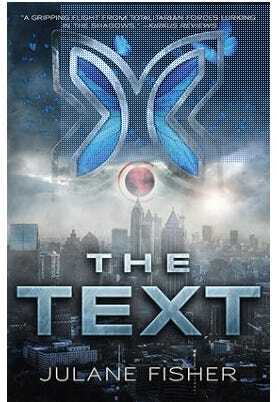
Yeah, quite the setup, I know. If there’s a sequel to this one, let’s hope Rami does the right thing and sides with the Resistance. She faced quite an internal struggle after this revelation, and that’s what makes her such a compelling character.
Shadow Runner by K.J. FielerThe newest member of the group, Shadow Runner by K.J. Fieler, doesn’t dive deeply into politics or anything close. For me, that was refreshing, since I don’t want blatant economics or politics thrown in my face at every turn when I sit down to read fiction.
But, one common denominator I’ve seen from libertarians involves looking inward, and that’s what I saw from our protagonist, Ada. She may have been frightened at her situation, as just about everyone in her position would be, but it didn’t stop her from adapting, growing, and bending it to her will.
It was something I noticed after reading the first half of the book, and it wasn’t long before I sacrificed sleep because I was raring to see how this one would end. Anyway, for libertarians looking around themselves and talking about how much the world sucks, Ada reminds us that we have the power to look inward and take action to better ourselves, which might help more than you may think.
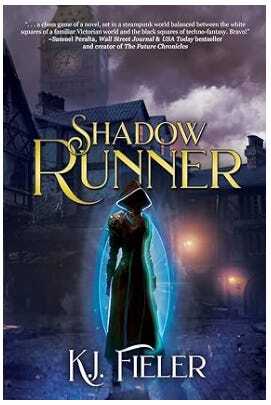
A wise man once told me that the best way to ‘fight’ anything is to focus on self-improvement. Well, Ada certainly would have heeded to his advice, and she’s been enjoying some small victories.



